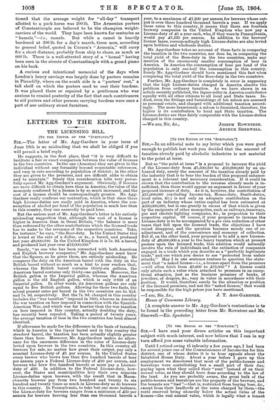THE LICENSING BILL.
[TO THE EDITOR OF THE "SPECTATOR."]
Si,—The letter of Mr. Agg- Gardner in your issue of June 18th is so misleading that we shall be obliged if you will permit a brief reply.
He suggests, in the first place, that "it is very difficult to institute a fair or exact comparison between the value of licenses
in the two countries. In the one (America) they are given to the individual without any formality beyond respectable references, and vary in rate according to population of district ; in the other they are given to the premises, and are difficult alike to obtain
and to maintain." Surely this consideration tells very power- fully against Mr. Agg-Gardner's argument. Obviously, if licenses
are more difficult to obtain here than in America, the value of the
monopoly conferred by a license is by so much increased, and the cost of a license should be correspondingly greater. Mr. Agg-
Gardner really confirms our contention, which is that since these high License-duties are easily paid in America, where the con- sumption of alcohol per head of the population is much less than in this country, they can assuredly be paid here.
But the serious part of Mr. Agg-Gardner's letter is his entirely misleading suggestion that, although the cost of a license is higher in America than in Great Britain, "the balance is more than redressed by the other contributions which the licensed trade has to make to the revenues of the respective countries. Take, for instance," he says, "the Beer-duty. In the United States this is levied at the rate of a dollar, or 4s., a barrel, and produced last year 48,000,000. In the United Kingdom it is 7s. 9d. a barrel, and produced last year over 413,000,000."
Surely, "as one who has been connected with both American and English brewery companies," Mr. Agg-Gardner must know that the figures, as he gives them, are entirely misleading. He compares the duty on the American barrel with the duty on the British barrel without so much as a hint to your readers that, whereas the British barrel contains thirty-six gallons, the American barrel contains only thirty-one gallons. Moreover, the British gallon is the Imperial gallon, whereas the American
gallon is the old English gallon, which is only 0.833 of an
Imperial gallon. In other words six American gallons are only
equal to five British gallons. words, for these two facts, the
actual present rates per barrel in the two countries are 5s. 64d. and 7s. 9d. respectively. But the 7s. 9d. charged in this country includes the "war taxation" imposed in 1900, whereas in America the war taxation on beer imposed in connection with the Spanish- American War, and which was far heavier than the war taxation on beer imposed in this country, actually doubling the duty, has recently been repealed. Taking a period of twenty years, the average taxation of beer in the two countries has been almost identical.
If allowance be made for the difference in the basis of taxation, which in America is the liquid barrel and in this country the standard barrel, the taxation has been actually slightly greater there than here. Moreover, Mr. Agg-Gardner makes no allow- ance for the enormous difference in the rates of License-duty levied upon brewers in the two countries. In this country all
brewers for sale, no matter how great their output, pay only a nominal License-duty of 41 per annum. Iii the United States
every brewer who brews less than five hundred barrels of. beer per annum pays a Federal License-duty of 410 per annum, and brewers who brew five hundred barrels or more pay a License-
duty of 420. In addition to the Federal License-duty, how- ever, the States and municipalities levy their own separate License-duties upon brewers, with the result that in Massa- chusetts brewers pay from two hundred and twenty to six hundred and twenty times as much in License-duty as do brewers in this country. In Pennsylvania, to take brit one more instance, the License-duty for brewers ranges from a minimum of 450 per annum for brewers brewing less than one thousand barrels a year, to a maximum of 41,200 per annum for brewers whose out- put is over three hundred thousand barrels a year. If we apply these rates to this country, it means that there are fourteen brewery companies in the United Kingdom who now pay a License-duty of 41 a year each, who, if they were in Pennsylvania, would . pay 41,220 per annum. In addition to the brewers' license taxes,.correspondingly high License-duties are also levied upon bottlers and wholesale dealers.
Mr. Agg-Gardner takes no account of these facts in comparing the taxation in the two countries, nor does he, in comparing the total yield of the Beer-duty in the two countries, make any mention of the enormously smaller consumption of beer in America. In America the consumption of beer per head of the population is. only one-half _ the. consumption in -this country.
Surely Mr..Agg-Gardner. should have mentioned this fact when comparing the total yield of the Beer-duty in the two countries.
Further, Mr. Agg-Gardner is completely in error in supposing that the high License-duties charged in America absolve the publican from ordinary taxation. As we have shown in an article recently published, the liquor-seller in America contributes equally with all other citizens to all local and State taxes. In- deed, even the fittings and furnishings of his saloon are assessed as personal estate, and charged with additional taxation accord- ingly. The more luxuriously a saloon is furnished, therefore, the higher is its contribution to local and State taxation. The License-duties are thus fairly comparable with the License-duties charged in this country.
—We are, Sir, &c., JOSEPH ROWNTREE.
ARTHUR SHERWELL.


























































 Previous page
Previous page